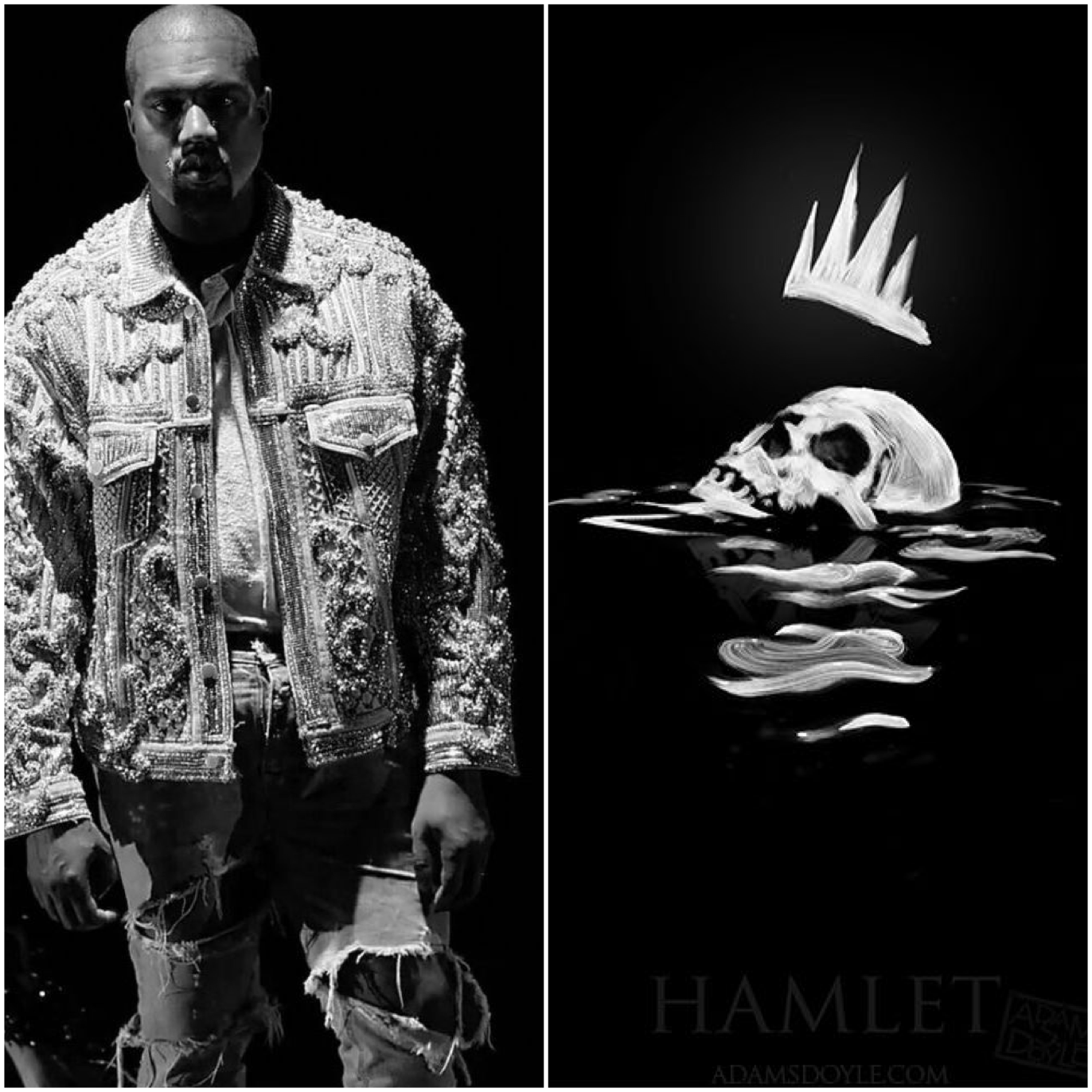The Hamlet Complex: Kanye West
Hamlet v. Kanye
To be, or not to be v. I Thought About Killing You
On June 1, 2018, Kanye West released his anticipated album, Ye, within his most controversial year. As fans hoped, West addresses his involvement in various controversies. The album has no limits in terms of topics discussed, evident from merely the album art reading, "I hate being bipolar it's awesome."
The first song is perhaps the most contentious track, "I Thought About Killing You." The song appears as an inner dialogue of a narcissist. The lyrics state that West considered killing 'you.' Yet, he also thought of killing himself, which he loves more than 'you.' However, the song's criticism is undeserving as West's lyrics display his internal conflict in an authentic, unfiltered manner.
The lyrics, written in a stream of consciousness, depict West grappling with his feelings toward life/death. The man vs. self-conflict evident in West's text is reminiscent of the tumultuous Shakespearan plots, notably Hamlet's 'To be, or not to be' monologue.
Both West and the fictional Hamlet hypothesize life's value, arriving at their conclusions. Hamlet, crafted by Shakespeare, and West oppose the norms of music and performance, touching upon the stigmatized topic of mental health. Yet, notwithstanding these differing figures performing in their distinct periods, there is a prevailing interest in the meaning of life and the internal conflicts that ensue.
KANYE: I know, I know, I know, I know, know
I, I know it, I know it (I know, I know, I know, I know, know)
The most beautiful thoughts are always besides the darkest
Today I seriously thought about killing you
I contemplated, premeditated murder
And I think about killing myself
And I love myself way more than I love you, so
Today I thought about killing you, premeditated murder
You'd only care enough to kill somebody you love
The most beautiful thoughts are always beside the darkest
(Mhm—mhm—mhm—mhm—mhmm)
Just say it out loud to see how it feels
People say, "Don't say this, don't say that"
Just say out loud, just to see how it feels
Weigh all the options, nothing's off the table
Today I thought about killing you, premeditated murder
I think about killing myself, and I, I love myself way more than I love you
The most beautiful thoughts are always beside the darkest
(Mhm—mhm—mhm—mhm—mhm—mhm—mhm—mhm—mhmm)
I think this is the part where I'm supposed to say something good
To compensate it so it doesn't come off bad
But sometimes I think really bad things
Really, really, really bad things
And I love myself way more than I love you
See, if I was trying to relate it to more people
I'd probably say I'm struggling with loving myself
Because that seems like a common theme
But that's not the case here
I love myself way more than I love you
And I think about killing myself
So, best believe, I thought about killing you today
Premeditated murder
HAMLET: To be, or not to be--that is the question:
Whether 'tis nobler in the mind to suffer
The slings and arrows of outrageous fortune
Or to take arms against a sea of troubles
And by opposing end them. To die, to sleep--
No more--and by a sleep to say we end
The heartache, and the thousand natural shocks
That flesh is heir to. 'Tis a consummation
Devoutly to be wished. To die, to sleep--
To sleep--perchance to dream: ay, there's the rub,
For in that sleep of death what dreams may come
When we have shuffled off this mortal coil,
Must give us pause. There's the respect
That makes calamity of so long life.
For who would bear the whips and scorns of time,
Th' oppressor's wrong, the proud man's contumely
The pangs of despised love, the law's delay,
The insolence of office, and the spurns
That patient merit of th' unworthy takes,
When he himself might his quietus make
With a bare bodkin? Who would fardels bear,
To grunt and sweat under a weary life,
But that the dread of something after death,
The undiscovered country, from whose bourn
No traveller returns, puzzles the will,
And makes us rather bear those ills we have
Than fly to others that we know not of?
Thus conscience does make cowards of us all,
And thus the native hue of resolution
Is sicklied o'er with the pale cast of thought,
And enterprise of great pitch and moment
With this regard their currents turn awry
And lose the name of action. -- Soft you now,
The fair Ophelia! -- Nymph, in thy orisons
Be all my sins remembered.
